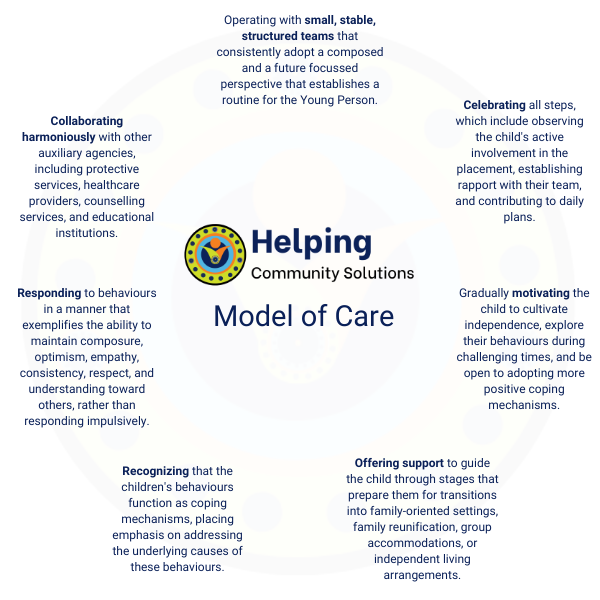Every child needs care
HCS is a community services organisation established to assist the Department of Communities in housing at-risk youth during times of crisis. HCS offers solutions to help young people in crisis including temporary and group foster care.
Our team is made up of highly compassionate and experienced individuals including but not limited to: Mental Health Coordinators, Community Service Coordinators, Client Engagement Officers, Nurses, Property Coordinators, and Youth Workers.
HCS’s aim is to assist our young people in transitioning to more suitable long-term placements. Such placements may include co-tenanting models, semi-independent setups, or independent living. Future placements may also be managed by other entities such as foster care programs or family reunification initiatives.


Why we're here
Most Western Australian children grow up in a family that protects and cares for them. They experience home as a place of love, where they can safely grow, explore, and learn about the world. For some children, however, home is not a safe place. In the most unsafe of circumstances, and as a last resort, the Department of Communities (Communities) will take action to remove these children from their homes to protect them from suffering further harm and/or neglect.
On behalf of the Western Australian community, Communities takes on parental responsibility and care of these children. The purpose of out-of-home care (OOHC) is to provide children with stable and nurturing care that enables them to heal from the trauma they have suffered so they can lead their best lives. A central part of this care is to support children to develop and maintain long-lasting relationships with their biological family, carer family and other safe and nurturing people.
The desired outcome is for these children to be adults who can reach their full potential, feel they belong, and are valued and included in the Western Australian community.
When a child is referred to HCS, they typically display challenging behaviours stemming from their exposure to severely challenging environments, including abuse, neglect, and other traumatic situations. HCS understands the importance of meeting our young people with empathy, patience, compassion, and a future-focused perspective.
Our highly experienced teams of Care Coordinators and Youth Workers are committed to providing the highest level of care and understanding to the young people who need it the most. We do this through our HCS Model of Care and adherence to evidence-based practices.
Youth in out-of-home care
Background
Over the past decade, there have been calls for reform to out-of-home (OOHC) care in WA, and in 2016 the Department for Child Protection and Family Support released its OOHC reform plan Building a Better Future. As part of these reforms, it was recommended that the Department contract the community services sector to provide more innovative, flexible, and efficient service delivery. HCS exists to fulfil the needs of the most vulnerable members of our community.
Care & Governance
HCS acknowledges the importance of clinical frameworks and the monitoring and evaluation of outcomes. Our HCS Clinical Governance Committee is committed to ensuring that Helping Community Solutions delivers evidence-based, trauma-informed service provision across all program streams to ensure quality client outcomes for those we serve.
HCS also has a Clinical Governance Framework in place to ensure that as a provider of Vulnerable OOHC participants, the child, young people, and families in placement arrangements receive safe and stable quality care arrangements.
Relevant Legislation & Frameworks
- Privacy Act 1988
- United Nations Declaration on the Rights of the Child 1990
- The Children and Community Services Act 2004
- Charter of Rights for Children and Young People in Care 2006
- Work Health & Safety Act 2011
- The Positive Behaviour Support Capability Framework
- National Standards for out-of-home care July 2011
- Better Care, Better Services (CPFS)
- Royal Commission into Institutional Responses to Child Sexual Abuse, Creating Child Safe Institutions, July 2016
- Aboriginal Services and Practice Framework 2016-2018
- Care Team Approach Practice Framework
- National Principles for Child Safe Organisations WA: Guidelines 2019
- The Guidelines for Protecting Children 2020

Our Vision
Safer and more suitable accommodation and housing solutions for the young people in our care, and in the care of the Department.
Improved health outcomes for youth in our care, and a wider application of Trauma-informed Care.
Increased access to employment solutions and opportunities for self-determined income for our youth in care.
Partnerships with community service providers and community leaders, to ensure a holistic prevention/intervention approach within all communities where there are need for services like ours.
Highly developed systems for quality assurance, compliance and to provide efficient and responsive solutions
To ensure we continue to be an employer of choice and engage the highest quality staff, with a culture that supports client-led service delivery

The HCS Model of Care
Development
Work towards the HCS Model of Care began in 2021 in line with the Delivering Community Services in Partnership Policy, which acknowledges the expertise of community service operators regarding the most appropriate service model to deliver the best outcomes for youth in care.
Our model reflects our concerted effort to synergise evidence-based practices and our wealth of applied knowledge gained through our work. The HCS Model of Care is under continuous development as we discover more effective ways to serve youth in care through our ongoing work in the sector.
Key qualities for care arrangements
In line with the policy mentioned above, the HCS Model of Care demonstrates the following key qualities:
- Provide care in a trauma-informed, culturally connected and competent way.
- Be flexible and agile to the changing needs of children to promote stable care.
arrangements - Work Collaboratively with Communities.
